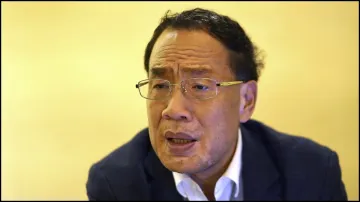Beijing: The first scientist from China who published a sequence of the COVID-19 virus said he was allowed back into his lab after he spent days outside, staging a sit-in protest. Zhang Yongzhen wrote in an online post on Wednesday that authorities had "tentatively agreed" to allow him and his team to return to his laboratory and continue their research for the time being.
Zhang had been staging a sit-in protest outside his lab since the weekend after he and his team were suddenly notified they had to leave their lab, a sign of Beijing's continuing pressure on scientists conducting research on the coronavirus. On the other hand, the Shanghai Public Health Clinical Centre said Zhang's lab was being renovated and was closed for safety reasons.
However, Zhang said his team wasn't offered an alternative until after the eviction and the new lab didn't meet safety standards for conducting their research, leaving his team in limbo. His latest difficulty was a reflection of how China has sought to control information related to the virus.
Zhang's sit-in protest
When Zhang tried to enter his lab over the weekend, guards barred him from entering. In protest, he sat outside on flattened cardboard in drizzling rain, pictures from the scene posted online show. “I won’t leave, I won’t quit, I am pursuing science and the truth!” he wrote in a post on the Chinese social media platform Weibo that was later deleted. “The Public Health Center are refusing to let me and my students go inside the laboratory office to take shelter.”
Zhang said it was “inconvenient” for him to speak when an Associated Press reporter reached him by phone on Tuesday, saying there were other people listening in. But in an email to collaborator Edward Holmes seen by AP, Zhang confirmed he was sleeping outside his lab after guards barred him from entering.
An AP reporter was blocked by a guard at an entrance to the compound where Zhang’s lab is located. A staff member at the National Health Commission, China’s top health authority, said by phone that they were not the main department in charge and referred questions to the Shanghai government. The Shanghai government did not immediately respond to a request for comment.
Zhang's role in preventing COVID-19 outbreak in 2020
Zhang’s ordeal started when he and his team sequenced the virus on January 5, 2020, and wrote an internal notice warning Chinese authorities of its potential to spread. At the time, Zhang had not yet made the sequence public. The next day, Zhang’s lab was ordered temporarily shut down by China’s top health official, and Zhang came under pressure from Chinese authorities.
Foreign scientists soon learned that Zhang and other Chinese scientists had sequenced the virus but had not yet been permitted to publish them, prompting public calls for publication. In response, Zhang published his sequence of the coronavirus on January 11, 2020, despite a lack of government permission. The move allowed health authorities around the world to begin testing for the virus, revealing that it was spreading outside China’s borders and triggering the development of test kits, vaccinations and disease control measures
Zhang was later awarded prizes in recognition of his work. However, his publication of the sequence also prompted additional scrutiny of his lab, according to Holmes, Zhang’s collaborator and a virologist at the University of Sydney. Zhang was removed from a post at the Chinese Centre for Disease Control and Prevention and barred from collaborating with some of his former partners, crippling his research.
“Ever since he defied the authorities by releasing the genome sequence of the virus that causes COVID-19 there has been a campaign against him,” Holmes said. “He’s been broken by this process and I’m amazed he has been able to work at all.”
(with inputs from agencies)
ALSO READ | Chinese scientist, who stunned whole world by publishing COVID sequence in 2020, kicked out of his lab
Latest World News
